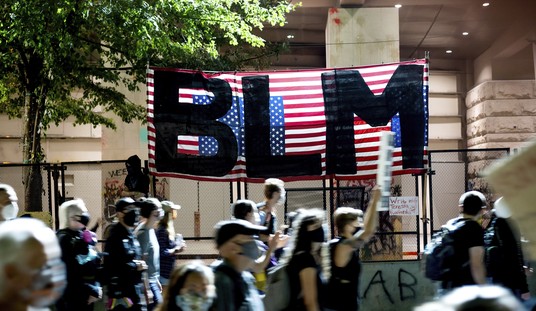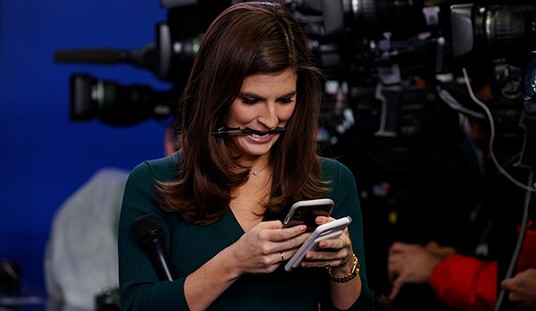Do laws against telling falsehoods in political ads chill free political speech? The Supreme Court will take up that question today, hearing oral arguments in Susan B. Anthony List v. Steven Driehaus. Dreihaus, a former one-term Congressman from Ohio, filed a complaint against SBA List over billboards that he claimed misrepresented his position on abortion in relation to his support for ObamaCare. A state commission subcommittee referred the matter to the full panel for action, at which point SBA List sued Ohio over the law itself. Today, the court will take under consideration a number of issues, including whether SBA List has standing to challenge the law any longer:
The Supreme Court will consider Tuesday whether two conservative groups can pursue a free-speech challenge to an Ohio false-statements law that if allowed would advance a broader push against state laws making it illegal to lie about a political candidate or ballot initiative.
Although Ohio’s elections commission rarely refers complaints over false statements for prosecution, the conservative groups, including the antiabortion organization Susan B. Anthony List, said the law discouraged them from running advertisements against a Democratic congressman.
“It almost never comes to a criminal prosecution, but that doesn’t mean there’s no chilling effect on speech,” Daniel Tokaji, a law professor at Ohio State University who isn’t involved in the case, said of the law.
More than a dozen other states have laws authorizing criminal or civil penalties for spreading falsehoods in political campaigns. The Supreme Court’s eventual ruling, expected by June, is unlikely to affect the state laws or political discourse in the current elections cycle. The case would instead likely be sent back for lower courts to consider whether the false-statement law violates the First Amendment by improperly suppressing protected speech.
Lyle Denniston of SCOTUSBlog writes that the biggest struggle for the court will be to refrain from overreaching:
In all of the history of the First Amendment, the Court has never ruled that false statements are totally without protection under the Constitution. It made the point again (although in a somewhat uncertain ruling that lacked a clear majority) in the decision two years ago in United States v. Alvarez, which took most of the punch out of a federal law making it a federal crime to falsely claim that one had received a military medal. That, too, involved political speech.
But if a group or an individual wants to challenge a law that outlaws speech, how and when is it allowed to go to court to claim the protection of the First Amendment? That is the issue the Court faces next week, in the first case to reach it in which opposition to the new federal health care law became a campaign issue. …
One of the main tasks facing the Justices as they take up this case will be to discipline themselves to keep their attention focused on the questions they have actually agreed to decide: that is, how and when may a court case go forward against a law that aims at limiting expression protected by the First Amendment.
That is a constitutional issue, to be sure, based on how the Justices interpret — in the political rhetoric context – the Article III limitations on the power of federal courts. But so much of what has been said in the briefing in this case is about the merits of the Ohio truth-in-politics law that this constitutional question may thrust itself front and center.
Will the Court, if it shares the concern expressed here about supposed bureaucratic meddling in the heat of an election campaign, be driven to assure the continuation of a lawsuit designed to stop that meddling? In other words, what role — if any — does the potential invalidity of a law play in deciding whether Article III allows it to be challenged in federal court? Should the courthouse door stand more widely open for a challenge that, at the very outset, seems more meritorious in the end?
This is a Court with a committed majority in favor of enlarging First Amendment rights in general, and in political expression in particular. But it is also a Court that has shown a decided tendency to scale back on access to the federal courts, by taking a fairly stringent view of what Article III demands. If there is a tension there, how will this Court deal with it?
One way to deal with it would be to address the core issue while leaving the rest alone. That might be unsatisfactory to those looking for more clarity on Article III access issues, but a direct decision on the merits would at least provide a sotto voce endorsement for standing on behalf of those intimidated out of the political debate, rather than just provide legal standing to those willing to endure an oppressive exercise of state power against speech. After all, that’s what the First Amendment is supposed to prevent, with the implicit understanding that the issue at hand is just as much the intimidation of people into silence as it is the explicit punishment of dissent.
If the court chooses to go after the main issue, then the forum may be unusually entertaining:
But it was a humor- and satire-laden brief filed by the Cato Institute’s Ilya Shapiro and humorist (and former National Lampoon editor) P.J. O’Rourke that made waves in legal circles.
“Can a state government criminalize political statements that are less than 100% truthful?” they asked in their 24-page brief. And as an original source on the idea of “truthiness,” they cited the early comedic work of TV personality Stephen Colbert.
“In modern times, ‘truthiness’—a ‘truth’ asserted ‘from the gut’ or because it ‘feels right,’ without regard to evidence or logic —is also a key part of political discourse. It is difficult to imagine life without it, and our political discourse is weakened by Orwellian laws that try to prohibit it,” the brief says, crediting Colbert has the father of “truthiness” in a footnote. …
And while there is some debate about Colbert as the first person to use the word, a sketch about “truthiness” was part of the successful pilot episode of the Colbert Report back in October 2005.
It’s more likely that the Supreme Court will order the district court to hear arguments on the First Amendment claim by restoring standing to SBA List than it will be to decide the issues itself. However, the case would inevitably work its way back to the Supreme Court, and if they reach a consensus on the dangers of government fact checks on political ads, they may see their way clear to rolling them all back — in Ohio and elsewhere — earlier rather than later.
The court will hear another case today, ABC v Aereo, which may have some impact on the delivery of televised entertainment:
Three decades later, the court is once again considering whether a new technology — one that relies on cloud computing to store programming — violates the Copyright Act. And as in decades past, there are parties on both sides warning of the huge economic consequences that could come from the court’s ruling.
On Tuesday, the court considers those arguments in ABC, Inc. v. Aereo, Inc.
Since 2012, the startup company Aereo has given consumers a new way to watch or record over-the-air broadcast television. Typically, a consumer must have an antenna to pick up broadcast signals or a subscription to cable or satellite services. Aereo, by contrast, assigns its users an individual, remote antenna to pick up a signal so they can watch a program over the Internet — or record a program to their remote DVR storage space and watch it later.
Broadcast companies, including CBS, have balked at this technology, arguing that Aereo’s service is more akin to a cable subscription than it is to a DVR service. “Aereo isn’t just in the business of providing hardware. They’re selling a service,” Neal Katyal, former U.S. Solicitor General and an adviser to major broadcasters in this case, told CBS News Radio.
By that logic, Aereo should have to pay the same fees that cable companies do to retransmit network shows. Cable and satellite companies must pay retransmission fees because under the Copyright Act, only the owner of copyrighted content has the right to air a “public performance” of the content in question.
Aereo, meanwhile, argues that it isn’t airing “public performances.” By assigning each subscriber a personal antenna each time he or she logs on, the company says it is enabling many private performances, it says. The company is relying on the precedent set in the 2008 Cablevision case, in which a federal appeals court said that remote DVR storage systems don’t infringe on copyright protections.
This case looks much more ripe for a decision on the merits. One CBS analyst explains why Aereo will probably not fare well today:
Congressional action and intent will play a significant role in the deliberations, and ABC’s position fits with that legislative precedent. That may have some impact on cloud computing in general, but it seems more likely that the decision will get limited to rebroadcasts. If the decision overreaches, then Congress can fix that legislatively — just as they did 30 years ago.
Update: If the Supreme Court wants to take action today, how about restoring the SCOTUSBlog press credential? (h/t Instapundit)







Join the conversation as a VIP Member